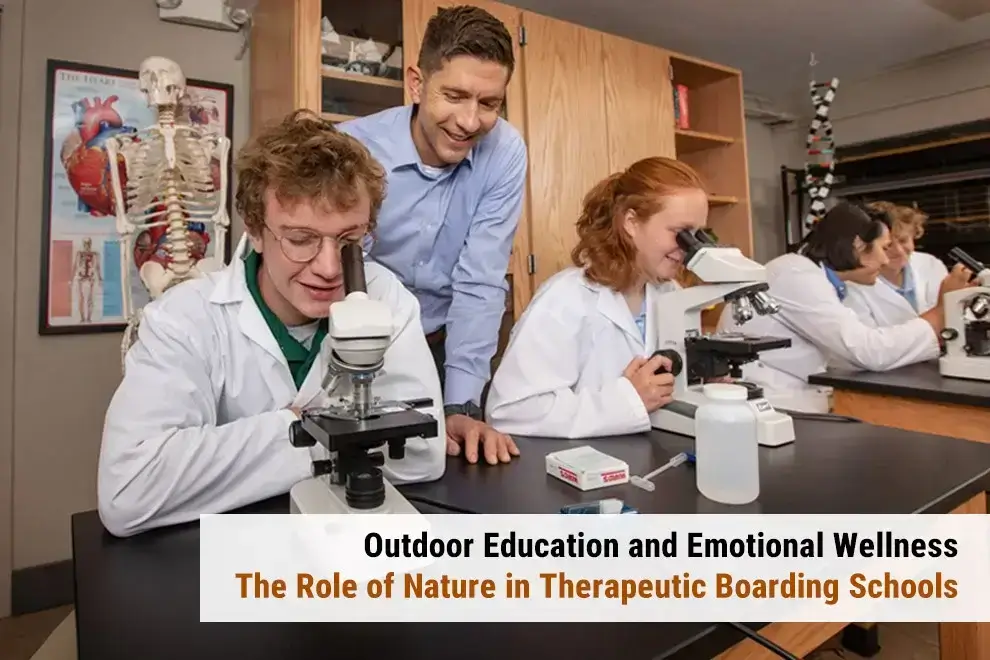Therapeutic Boarding Schools Concur Mental Health Issues
Mental health and emotional wellness are frequently overlooked, especially in young people. More and more children are finding themselves evaluated and diagnosed with mental health cases, and this is one reason why some parents are opting to send their child to a therapeutic boarding school. Therapeutic schools are integrating nature into their programs to help mitigate social and emotional stressors that exist in society today.
Research has indicated that nature may provide a support to mental health and help reduce the likelihood of stress showing up as mental illness.
What Exactly is a Therapeutic Boarding School?
Today’s world has been massively detracted from nature and made it abundantly clear that adolescents need a reconnection with the outdoors. One of the most alarming indicators is the growing number of mental illnesses in children, and following children into adolescent stages the number appears to increase. Therapeutic boarding schools are a viable intervention to support children in experiencing the continuation of their education and receiving any emotional care they need.
Combining on campus mental support through outdoor learning with the school’s curriculum helps create a structured environment for today’s youth. Adolescents who often struggle with behavioral, emotional, or psychiatric concerns can greatly benefit from a therapeutic boarding school. They have the opportunity to receive treatment, while not disengaging from an education. Clinical services with education is becoming a trend in the educational market.
What Role Does Nature Play in Therapeutic Boarding Schools?
The relationship with the natural environment influences the therapeutic boarding school, its development, and its content. Nature provides a risk-free environment designed to increase mental clarity, reduce stress, and increase life skills. By being physically active out in nature, there may be moments/durations of teamwork and trust by being active, which could encourage the adolescents’ connection to themselves and to their world. The whole idea behind nature therapy for children is to help kids overcome, while building their self-esteem.
The role of nature in therapeutic boarding includes:
- Grounding: Taking a hike or sitting by a running stream can help an individual feel at ease.
- Teamwork: Outdoor educational activities often require teamwork which builds trust among the students. Teamwork is an essential skill that will be very valuable when the teen enters the working world.
- Nature-Based Therapy: Using a combination of therapeutic guidance, physical activity, and outdoor experience will teach children how to overcome their struggles in life.
- Metal Clarity: Nature can help create a space for mental clarity. This allows the young adult to process their feelings and experiences, which encourages emotional healing.
- Detox: Nature helps detox the individual from negative influences and encourage self-reflection.
Benefits of Outdoor Education
Nature can serve as a refuge for people to heal. There are so many incredible benefits of nature that writing them all down would take a long time. Outdoor education provides not only emotional support for teens but also critical life skills.
Improvement in Mental Health
We have already addressed this one, but for the most part, being outdoors will help improve a person’s mental health and improve their mental wellness measures. Being outside can help provide less stress, anger, anxiety, and depression.
Teaches Emotional Realization
Kids sometimes have issues with controlling their emotions, but nature can help them become more aware of their actions and help them learn to control their reactions.
Confidence Building
Teens struggling with confidence can benefit in what nature has to offer. There is a greater chance for a child to get a sense of accomplishment when engaging in outdoor activities, which will help boost their self-esteem and confidence.
Social Skills
Outdoor education can facilitate teamwork, as well as help children develop social skills such as communication, cooperation, and problem-solving.
Attention
Nature-based activities can help people maintain and restore attention, an issue for many of today’s students who may have ADHD or other learning challenges.
Physical Activity
Being outside also promotes physical activity, an important contributor to mental health.
Connection
Nature also allows people to feel a sense of connection, which is important for people who are feeling disconnected.
How Can Therapeutic Boarding Schools Incorporate Outdoor Learning?
Wilderness programs
These programs place students in a natural environment, presenting challenges with outdoor activities and experiential exercises.
Horticultural programs
Students can engage in garden-related activities, which provide a sense of responsibility while promoting positive interactions with nature.
Outdoor education
Outdoor activities and experiential learning will encourage students to build confidence and develop life skills.
Forest bathing
This is a practice that allows students to immerse themselves in nature while practicing spirituality allowing them to become more conscious of their senses, decreasing stress, and enhancing relaxation.
Choose A Therapeutic Boarding School Today Therapeutic boarding schools that incorporate outdoor experiences can greatly help your teens’ mental health. These types of schools are created to help overall well-being while your children participate in academic programming. Nature possesses the skills for lifelong learning and to equip coping strategies that could serve your child later in life. As a society, we are typically on a fast track and spending time in nature can ground you. Nature can release some of the accumulated stress, develop social skills and help with personal confidence.
Also Read: Transforming Youth Mental Health: A Groundbreaking Initiative by Nelson Camp”










